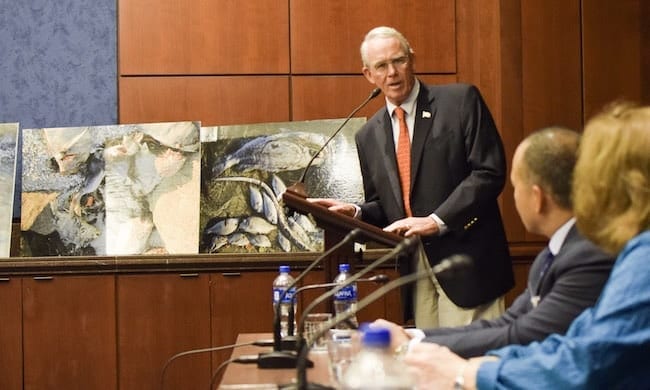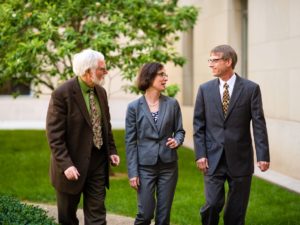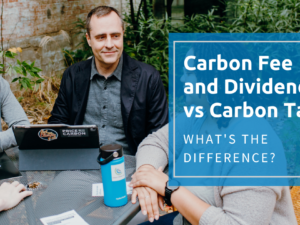
Rep. Francis Rooney (R_FL) speaks at a Capitol Hill briefing on red tide.
By Steve Valk
The latest Republican to join the bipartisan Climate Solutions Caucus can hardly be accused of greenwashing to keep his seat in Congress.
Despite the anticipated blue wave that finds many GOP incumbents fighting for their political lives, Rep. Francis Rooney’s district — Florida’s 19th — is considered safe, one that he carried with 66 percent of the vote in the 2016 election. Unlike a number of GOP colleagues who feel the need to moderate their position on climate change because of competitive races, Rooney has already emerged as a leader on climate change, not because of political pressure, but because of a desire to serve his constituents and protect the place he calls home.
Rooney’s motivation stems from the fact that his district faces considerable risks from climate change, be it rising sea levels, storms that are more destructive, or bigger and longer lasting red tides causing tons of dead marine life to wash up on beaches.
In a press release, Rooney said, “I joined the Climate Solutions Caucus because environmental issues are critical for our Southwest Florida community. Southwest Florida’s well-being depends on a healthy environment… To safeguard our future, proactive planning is necessary to mitigate effects of rising sea levels and increased intensity of flooding. I look forward to working with a bipartisan group of my colleagues on solving the problems of sea-level rise.”
Even before joining the caucus, Rooney distinguished himself at pivotal moments on the issue of climate change during the 115th Congress.
- In July, a resolution from Majority Whip Steve Scalise (R-LA) declaring that a carbon tax would be detrimental to the United States economy came to the floor of the U.S. House. Rooney was one of just six Republicans who voted against the resolution.
- Within a week of that vote, Climate Solutions Caucus co-chair Rep. Carlos Curbelo (R-FL) introduced his Market Choice Act, a bill that would put a fee on carbon, starting at $24 per ton, and use most of the proceeds to fund infrastructure projects. Shortly after introduction, Rooney signed on as the second co-sponsor, Rep. Brian Fitzpatrick (R-PA) being the other.
- Last week, Rooney introduced a resolution, co-sponsored by Florida Republican Matt Gaetz, “expressing the sense of the House of Representatives that sea level rise and flooding are of urgent concern impacting Florida that require proactive measures for community planning and the State’s tourism-based economy to adapt.” In a statement published in E&E News, Rooney said, “Sea-level rise and flooding, amplified by devastating hurricanes such as Hurricane Irma that ravaged our community one year ago, are an urgent concern to our many coastal communities in Florida. This requires proactive planning in our state, and by our tourism-based economy, to mitigate future costly damages to our infrastructure.”
- In addition to sea-level rise, another climate-related impact devastating Florida’s coast is harmful algal blooms, otherwise known as red tide. While naturally occurring, human influences such as warming oceans and pollution are making these catastrophic blooms larger and longer lasting. At a congressional briefing organized by CCL and Ocean Conservancy last week to elevate the issue of red tides, Rooney dropped in to lend his voice and support.
When he started his freshman term in 2017, Rooney’s views on climate change were similar to many Republicans in Congress. Chuck Holley, CCL group leader in Naples, Florida, recalls that the congressman’s response early on was along the lines of “climate change is happening, but we’re not sure how much of it is caused by humans.”
A year later, when the Naples group met face-to-face with Rooney for the first time, Holley said to the Congressman, “We understand you’re not sure about how much of climate change is caused by man.” Rooney responded, “Well, just about all of it.”
“At that point I threw out the script I had for the meeting and moved on to other things,” said Holley. There was no need for further education.
So, how did Rooney’s views on climate change evolve? Holley thought perhaps Hurricane Irma, which hit Florida a year ago, may have been a turning point. Rather than speculate, we asked the congressman.
“I’ve always felt it’s obvious that human activity has had an impact on climate, but I didn’t know as much about it until I studied it,” Rooney said. Part of that process involved reading the report from the Intergovernmental Panel on Climate Change, which distills studies from hundreds of scientific bodies throughout the world. “Life is a journey of continuous learning.”
As his sponsorship of the Market Choice Act might suggest, Rooney does not shy away from talking about carbon pricing. “I’m a business guy… A carbon tax is a rational incentive to drive coal out” and replace it with cleaner sources of energy.
Rooney sees the fight against climate change as a critical part of the effort to protect the tourism industry, the economic lifeblood of Florida. At the red tide briefing last week where Rooney spoke, experts cited unusually warm Gulf waters as a factor that worsened this season’s red tide, causing thousands of tons of marine wildlife to wash up on Florida beaches and resulting in millions of dollars in lost tourism revenue.
Another looming threat to tourism is sea level rise. It’s pretty simple: No beaches; no tourists. And at the current trajectory, those beaches – and some cities – will be underwater by the end of the century.
In his quest to learn more about rising seas, Rooney has talked with Mike Savarese, a CCL volunteer in the Naples chapter and a professor in the Department of Marine and Ecological Sciences at Florida Gulf Coast University. Last month, the two co-authored an op-ed on sea level rise that was published in several South Florida newspapers. From the op-ed:
“It is not enough to adapt to these changes locally and move forward without looking at the root causes and working toward a broader and more preventative solution… How do we adapt to sea-level rise while working to mitigate the predicted additional rise if we do not change course in our use of fossil fuels? We must all collaborate to influence decisions that can make a difference.”
Rooney’s support helped to secure a $1 million grant from the National Oceanic and Atmospheric Administration to predict the effect of sea level rise and stronger storms, which will be instrumental in developing adaptation plans in the area.
“I’m impressed with him as a person. He’s a man of his word,” said Savarese.
Looking at what he’s done this year, Rooney’s actions speak volumes about his commitment to fighting climate change. Assuming he retains his seat, he will be one of the Republicans to watch in the next Congress when climate legislation starts moving.





